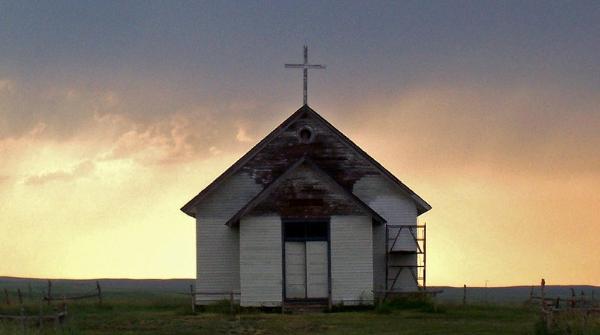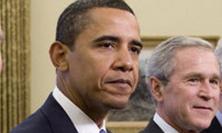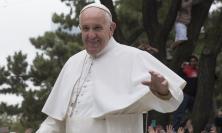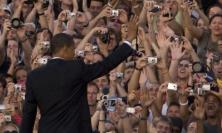In the United States, Democrats in the State of Pennsylvania hold their Primary today, which may finally decide who will be the party's presidential candidate. Paul Campbell comments on the significance of religious allegiance in this political race, and its positive and negative effects.
“God Bless America,” is not only a song famously belted out by the redoubtable Kate Smith, but also words that frequently conclude speeches by U.S. Presidents, evocative of American Exceptionalism - the belief that the United States is not only different, but better, than other nations. I have always wondered if these words are uttered in faithful supplication, if they are in the imperative, to demand of God a benediction, or simply a statement of confident expectation.
Whatever the reasons, moral and religious themes are invoked in the public sphere here with a frequency that often bemuses visitors from abroad, and there is a distinctly puritanical cast to much of our political dialogue. Last year I watched a news broadcast where the presenter asked a French journalist what he thought about the scandal of President Sarkozy's divorce. His puzzled but somewhat droll reply was that, while the development was certainly newsworthy, there was no element of scandal involved. The American journalist seemed quite taken aback by his French colleague's relaxed attitude.
Americans tend to intertwine religion, patriotism and guns with their politics in sometimes curious ways and can react strongly if they perceive that any of these cultural icons are under threat. Considerable media attention has been focused upon remarks delivered by Senator Barack Obama at a fundraising event:
"You go into these small towns in Pennsylvania and, like a lot of small towns in the Midwest, the jobs have been gone now for 25 years and nothing's replaced them. And they fell through the Clinton Administration, and the Bush Administration, and each successive administration has said that somehow these communities are gonna regenerate and they have not."
"And it's not surprising then they get bitter, they cling to guns or religion or antipathy to people who aren't like them or anti-immigrant sentiment or anti-trade sentiment as a way to explain their frustrations."
The comment seems thoughtful and perceptive, but it contains elements that make it an easy target for his political opponents, both Democratic and Republican. The first problem is that he made the comments in San Francisco, a city that since the 1960s has stood for many Americans as a symbol of all that is too liberal, snobby and licentious. Secondly, “bitter” is not an emotion that many of my fellow citizens deal with easily. After all, one of our national goals is the relentless “pursuit of happiness.” Thirdly, the notion that small town folks are “clinging” to guns and religion is taken as belittling them.
Senator John McCain, the presumptive Republican nominee, and Senator Hillary Clinton, Obama's only remaining Democratic rival, both jumped on the remarks and attacked them as revealing Obama's “elitist” viewpoint. Obama, a former community organizer from the distinctly non-elite Southside of Chicago and someone who only recently finished paying off his college loans, is being attacked by a longtime Arizona Senator married to a brewery heiress and by a New York Senator whose latest tax information showed that she and her husband had earned more than $109 million since President Clinton left office. All this might strike dispassionate observers as somewhat peculiar, but they should also remember that, in 2000, the Yale-educated George W. Bush was successfully sold to the American people as the candidate with whom they'd most enjoy having a beer.
The firestorm produced by some snippets of sermons delivered by Obama's Pastor, the Rev. Jeremiah Wright of the United Church of Christ, might also seem odd to those unfamiliar with the rhetoric of race-tinged politics. Wright claimed that past U.S. policies were partially responsible for the September 11 attacks. At one point he shouted out, “God bless America... No!... God Damn America,” and at another juncture he suggested that the US government may have used HIV/AIDS in a genocidal attack on African Americans.
Several commentators noted that Martin Luther King, Jr., a veritable secular saint, had made similar or even stronger remarks, calling America the “greatest purveyor of violence in the world today” and once announcing that “America was founded on genocide, and a nation that is founded on genocide is destructive.” No matter. Almost completely negative media coverage followed as pundits demanded to know if Obama had been present for the offending sermons and asked why he had not denounced them. Facing a drop in the polls, Obama refused to condemn his friend and Pastor but disassociated himself from his comments, divorced Wright from his campaign and a few days later delivered a speech, “A More Perfect Union,” which many have described as the most important public pronouncement about race in several decades.
Obama's trouble with Pastor Wright may have helped him in an another way. Ever since Barrack Hussein Obama had announced his candidacy for the Presidency, there has been speculation that Obama is a crypto-Muslim. Right wing news outlets suggested that Obama had attended a fundamentalist Islamic madrasah (school) while growing up in Indonesia, and although CNN quickly dispatched a reporter who refuted the story, the whispering campaign continued via email. Even Senator Clinton got involved when, in March 2008, she told a reporter that Obama was not a Muslim, “as far as I know.”
Hillary Clinton, a member of the United Methodist Church, is said to be an active participant in Bible Study and prayer circles. At a recent “Compassion Forum” where she and Senator Obama agreed to talk (separately) in a televised town hall format about religion, she said:
“You know, I have, ever since I've been a little girl, felt the presence of God in my life. And it has been a gift of grace that has, for me, been incredibly sustaining. But, really, ever since I was a child, I have felt the enveloping support and love of God and I have had the experiences on many, many occasions where I felt like the Holy Spirit was there with me as I made a journey… we are so fortunate because we have taken the gifts that God gave us and we have created this democracy where we choose our leaders and we have to be more mindful of how important and serious a business this is.
And, therefore, when I say politics is not a game, it is really coming from deep within me because I know that we have the opportunity to really give other people a chance to live up to their own God-given potential. And that, to me, is the kind of grace note that makes politics worthwhile.”
All this having been said, she flies rather low under the radar as far as religion is concerned. Her official website has no evident link to religious or spiritual content (unlike Obama's.) She rarely invokes her faith to explain why she has taken a position one way or another, with the notable exception of immigration where she has said that proposed tough new anti-illegal immigrant legislation would “criminalize the Good Samaritan... and even Jesus himself.”
She is “pro-choice” on abortion, although she recently said that the potential for life may exist at conception and she has touted her attempts to reduce teen pregnancy through various efforts. The one area where she differs from her United Methodist Church is in her strong support of the Death Penalty. In this she is in agreement with 60% of the American public, including Catholics.
Although she does not normally invoke her faith in the political arena, she is keenly aware of the importance of what are often called “Values” voters, who are mostly Evangelicals with some Catholics thrown in for good measure. Clinton went on the record, shortly after G.W. Bush's re-election in 2004, saying that it would be a mistake for Democrats not to engage Evangelicals on their own turf. To this end, she has spoken not only in Clinton-friendly African American churches and to liberal groups like the Sojourners, but also to the congregation at the Saddleback mega-church whose influential Pastor, Rick Warren, is author of the perennial bestseller, A Purpose-Driven Life.
Clinton won eight of the ten primaries in states with the largest Catholic populations and is judged to be clearly ahead of Obama for the Catholic vote in the crucial Pennsylvania primary, largely because of the strong support she receives from Hispanic voters.
Although Clinton trails Obama in pledged delegates to the Democratic Convention in Denver this summer, it has been noted that Catholics have backed the winner in seven of the last eight presidential elections and that Clinton has maintained a solid 65% of the Catholic vote.
Senator John McCain, the presumptive Republican nominee, did not accept the invitation to talk about his faith at the recent “Compassion Forum” addressed by Clinton & Obama. He prefers, perhaps, to keep his head below the parapet, having had quite a bit of trouble on the religious front ever since his first run for the presidency.
In 2000, McCain ran an insurgent campaign against George W. Bush in which he promoted his maverick status within the Republican Party. At a time when Bush was embracing the Religious Right, McCain denounced a couple of influential Evangelical pastors as “agents of intolerance.” Having learned from his failure, McCain has made strong efforts to ingratiate himself both with Bush and with leading Evangelicals. He delivered the Commencement Address at the university founded by one of his “agents of intolerance” and has actively sought the support of prominent Evangelicals.
McCain enthusiastically accepted an endorsement from the Rev. John Hagee, pastor of a Texas mega-church and believer in a looming Apocalypse, despite Hagee's published views on Catholicism which he has called 'The Great Whore,' an 'apostate church,' the 'anti-Christ,' and a 'false cult system.' Some Catholics protested at this development and demanded that McCain renounce Hagee's endorsement in the same way that Obama renounced an unsolicited endorsement from Minister Louis Farrakhan, an anti-Semitic Islamic leader. McCain refused to do so, with his spokeswoman pointing out that while the Senator welcomed his support, “it shouldn't be seen as a wholesale endorsement of all of Mr. Hagee's views.”
In what looks like another move to embrace the Religious Right, McCain seems to have switched denominations. Asked in (heavily Baptist) South Carolina how his Episcopal faith affected his decision-making, he responded by saying, “It plays a role in my life. By the way, I'm not Episcopalian. I'm Baptist.” When reporters tried to follow up on this development, they were met with contradictory statements and obfuscation. When McCain was finally confronted on the issue by a television reporter, he said that he had been raised an Episcopalian but had attended North Phoenix Baptist Church with his (Baptist) wife and children for many years. He concluded by saying, “And the most important thing is that I am Christian, and I don't have anything else to say about the issue.”
Religion infuses and confuses American presidential politics. Some citizens are “single issue” voters; abortion, for example, has turned many otherwise solidly Democratic voters into loyal Republicans. Other believers struggle with the abortion issue, but conclude that the Democrats better protect the interests of the poorest and most vulnerable in the nation and so stick with them. On the Republican side, the party's embrace of the Religious Right has caused deep unease among members of the “Country Club” wing and has caused some of them to switch party affiliations. Other Republicans struggle with the party's tardy response to global warming and other ecological issues.
The vast majority of voters, however, are likely to put the economy, national security and foreign policy issues before religious or cultural concerns when they go to cast their ballots in November. Whatever the outcome, for the sake of this nation and of our world, I hope and pray that God will bless America.
Paul Brian Campbell SJ is Vice-President of Loyola Press, Chicago, USA.
Read more of Thinking Faith's coverage of the US elections:
![]() A Tale of Two Presidents – Michael Sean Winters
A Tale of Two Presidents – Michael Sean Winters
![]() What scares me about Obama – Gregory Chisholm SJ
What scares me about Obama – Gregory Chisholm SJ
![]() Republicans in the political wilderness – Keith McMillan SJ
Republicans in the political wilderness – Keith McMillan SJ
![]() Obama and the politics of community organising – Austen Ivereigh
Obama and the politics of community organising – Austen Ivereigh






